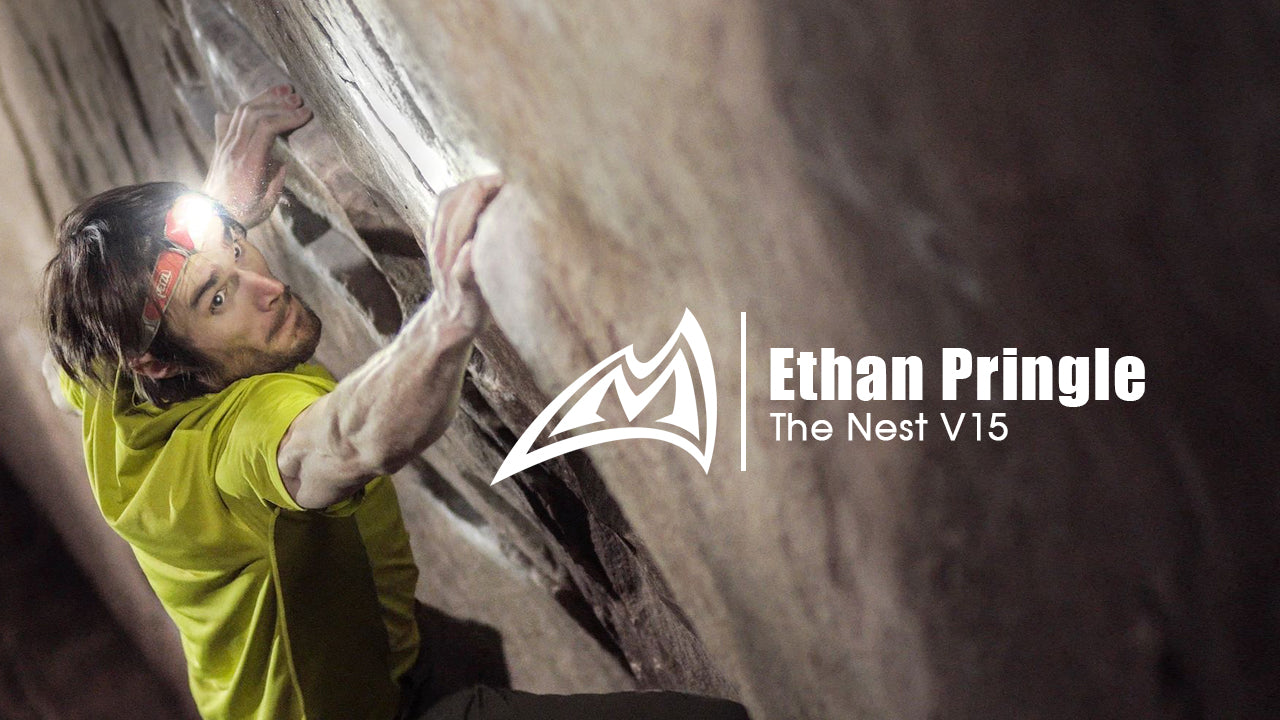By Ethan Pringle.
Courtesy of Touchstone Climbing
2014: The Quest for the Nest
The Nest is tucked deep in First Creek Canyon, in Red Rock, NV, about an hour hike west of HWY 159. Local developers Kenny Barker and Andy Rather, who were searching for FAs in the canyon in the winter of 2013/14, discovered the line and cleaned the holds. Kenny once told me they thought it was going to be “the best V12 in Red Rock” because the holds don’t look particularly bad or far apart, at a glance. Once they tried it, they immediately realized it was next-level difficult.
Later that winter, a crew of top-level boulderers— Nalle Hukkataival, Daniel Woods and Jimmy Webb—were lured to Red Rock with promises of world-class projects, including The Nest. The Nest gets its name from a scrub oak tree that sits below the upper half of the problem, in which climbers build a pad platform that protects falls from the crux. The trio quickly went to work on the line, sussing out beta and giving attempts, until Daniel and Jimmy both made back-to-back ascents of the problem just minutes apart, after an impressive five-day siege.
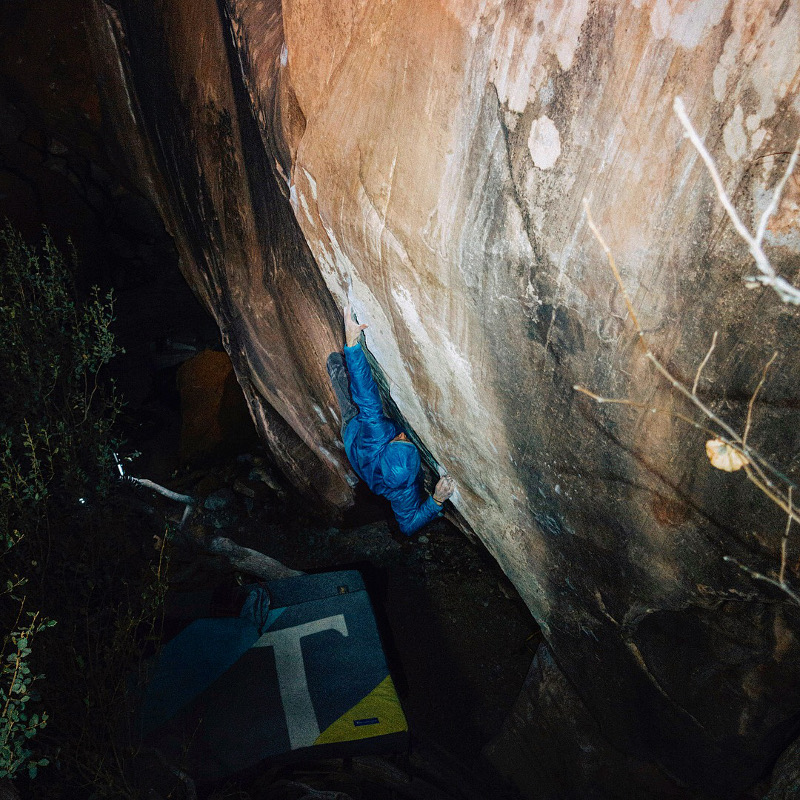
Paul Robinson came along close on their heels and dispatched The Nest in an astoundingly few number of days for its third ascent. Nalle was recovering from a shoulder injury at the time. Despite being able to FA a wild V12 dyno and a still unrepeated V13 mantle on the same boulder, he had to come back the next season to finish The Nest for its fourth ascent.
I was really inspired by the look of it—the perfect ladder of edges surrounded by blank rock, the quality of the movement, and of course its difficulty. It didn’t hurt that Jimmy said in the video that it was one of the best hard problems he’d ever seen and gave it “ten stars.”
I first saw photos of The Nest on social media and soon after watched the video by Cameron Maier documenting Daniel and Jimmy’s process of FA’ing the line. I was really inspired by the look of it—the perfect ladder of edges surrounded by blank rock, the quality of the movement, and of course its difficulty. It didn’t hurt that Jimmy said in the video that it was one of the best hard problems he’d ever seen and gave it “ten stars.” I remember watching that video and thinking, “I HAVE to do this boulder problem someday.”
On a warm afternoon in late spring of 2014, I hiked up for a look at it. The holds felt so bad and far apart that it seemed impossible (It didn’t help that it was 75 degrees out). But despite my initial reaction, I returned to Vegas the next winter to put a couple days on the problem. To my surprise, I was able to do every move on the problem in isolation, including the hideously difficult crux moves. It gave me hope that I just might be able to send it.
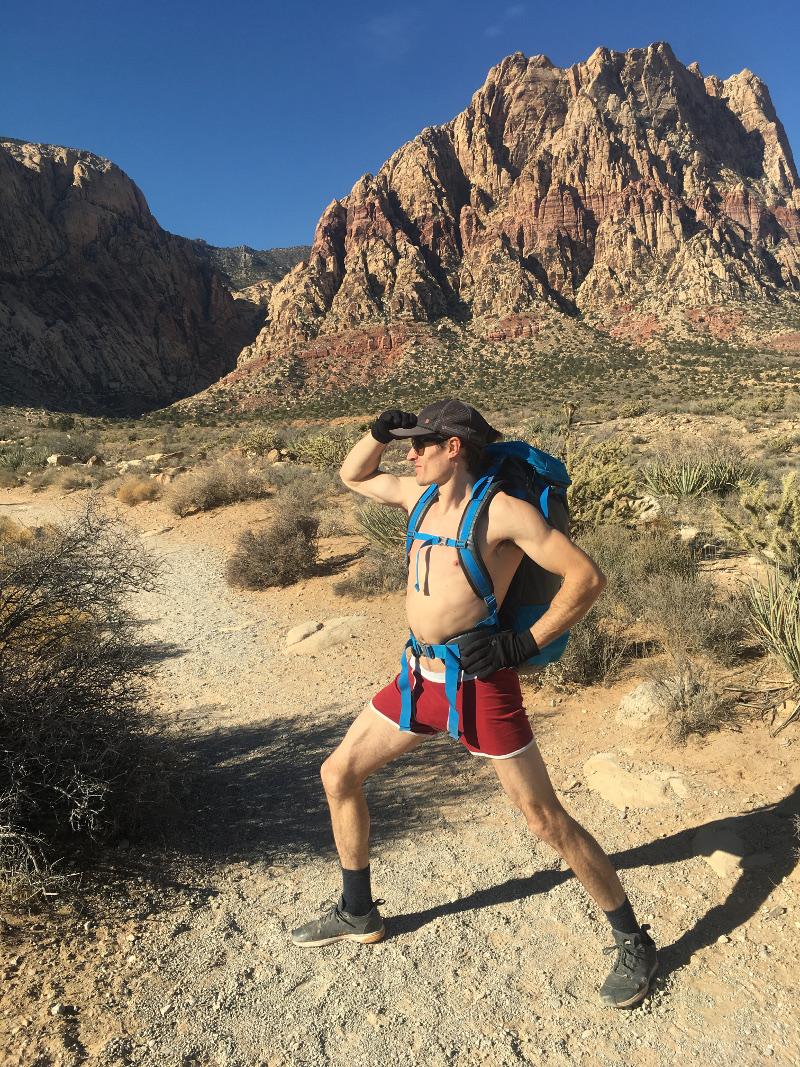
2015: Doubt
I returned to Vegas in December 2015, with my whole winter blocked out to boulder in Red Rocks and, specifically, to try The Nest. One frigid day I hiked up to the problem with British friends Ty Landman and Mark Heal. It was my second session of the season and I felt close to linking the V13 stand start. After just a few tries, I managed to pull it off. I was elated. I remember Ty saying, “you WILL do this boulder.” I believed he was right. All I needed to do was add a power-endurance, 11-move V11 into what I’d just done.
I returned to The Nest every few days and could repeat the stand start once or twice during most sessions, but to my surprise and increasing frustration, found it leagues more difficult coming from the sit. After falling on the same move for almost ten more days, I finally figured out a piece of micro-beta that I thought would make a big difference and my hope was renewed.
My excitement at being so close was evenly matched by my anguish.
Then, riding a high of confidence after sending Meadowlark Lemon (then rated V14) I went back up to The Nest and had a breakthrough attempt, falling on the last hard move from the start. With my friend Tara Kerzner filming, I came heartbreakingly close to sending several times that day. My excitement at being so close was evenly matched by my anguish.
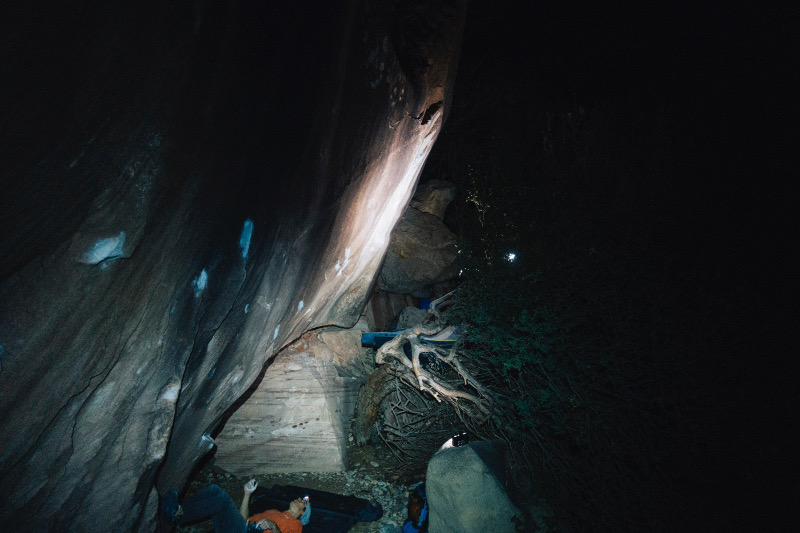
I kept trying The Nest that spring and had several more agonizingly close attempts. Soon though, the weather started to warm, my mind and body started to fatigue, and I started to regress. The number of close attempts became fewer and fewer. My motivation started to tank, but I kept hiking up for more. It felt like torture.
Pretty soon I hated the look of the place. It all felt too familiar and too routine, like how letting go at the end of the crux had become. I was reduced to tears several times that spring at The Nest. Eventually, I could no longer repeat the stand, and then the individual crux moves. I threw in the towel, vowing to come back the next season to finish it off.
2016: The Shortest Season
I arrived fairly early the next season, in December 2016, but immediately started suffering minor setbacks: I sprained my ankle badly; I flew home to be with my dad who’d gotten sick and ended up in the ER; it was raining a lot more than normal for Vegas. I didn’t get a chunk of uninterrupted time on The Nest until mid-February.
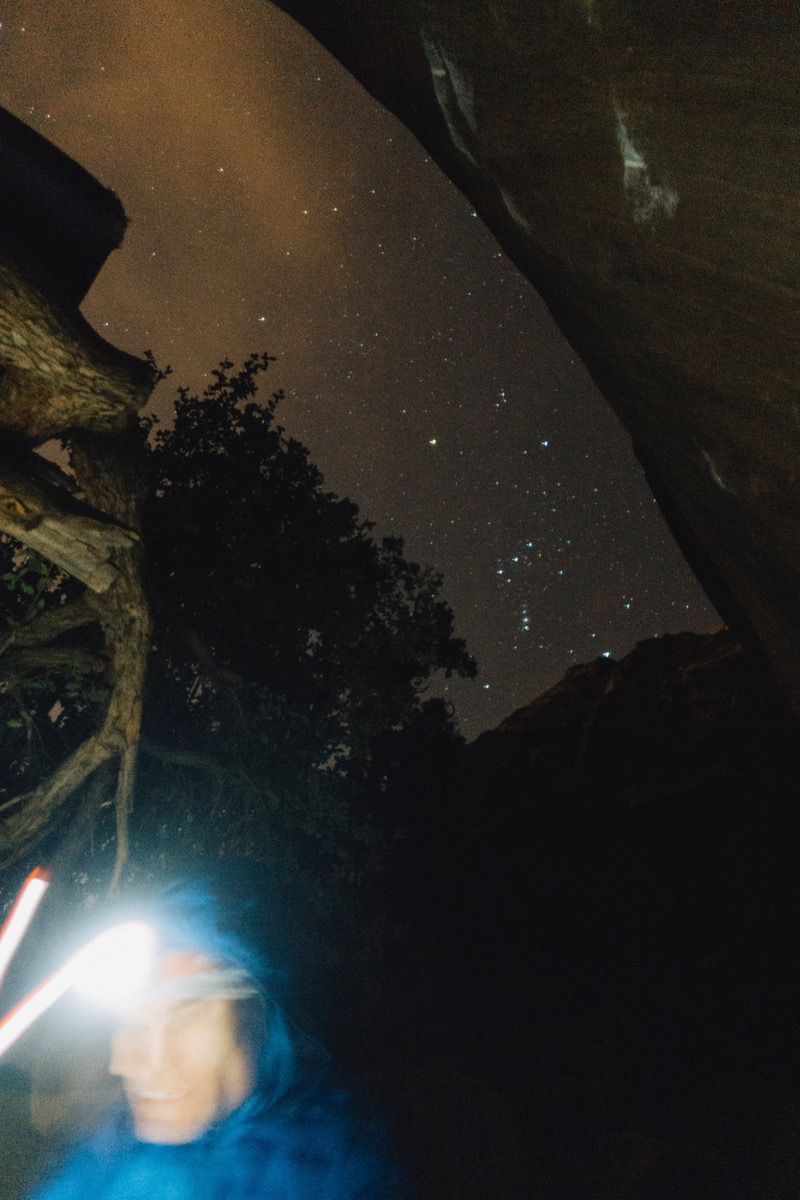
One night in early March, around 11:30 PM, with my friend Bruce Wilson filming, the friction felt perfect and I cruised up to the crux. I had started out the attempt with more confidence than I’d had in a long time, but again I let go of the wall at the last possible second, coming as close or closer than I’d ever been. Two days later it was 80 degrees in Vegas and I had no chance, even at night. Another season was over.
2017: The Nest Reborn
In 2017, I returned early in the season again with the one and only goal of finishing what has become the longest standing and most tormenting project of my career. Things didn’t start off great. My Chilean friend Facundo Langbehn, one of South America’s strongest climbers, who I’d been working on The Nest with last winter, came back and put the problem down in three sessions. I was psyched for Facundo, but it definitely intensified my frustration when I couldn’t seem to repeat the stand start after the same number of sessions. Finally, I started repeating the stand, but it felt desperate almost every time.
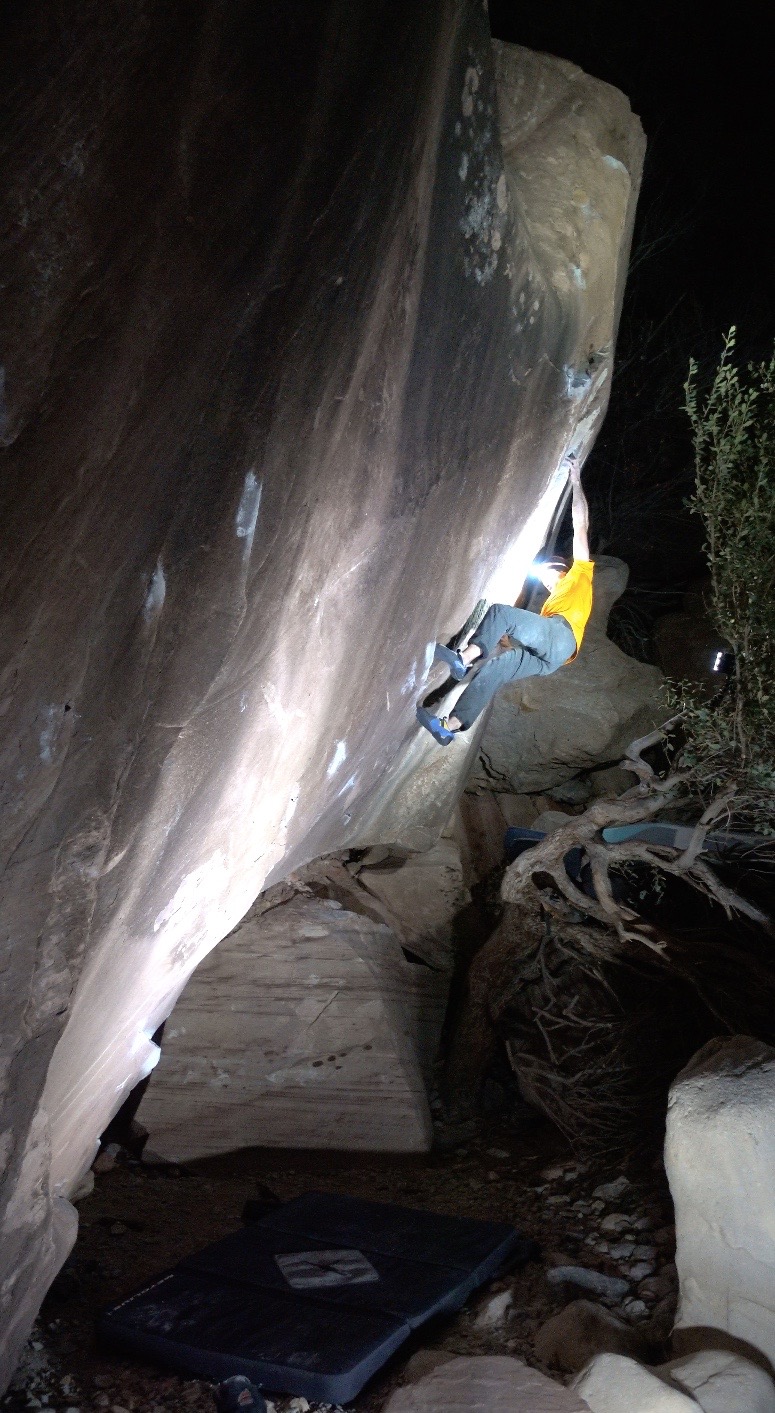
Another friend, underground bouldering wizard and Mario-look-alike Keenan Takahashi, started sieging The Nest, as well. Keenan was using the beta Paul, Nalle and Facundo all used: doing a big bump-move up to the better hold with the left hand, instead of what I was doing—controlling a poor, slippery pinch with the left hand to come into the better hold with the right. I always thought the bump beta must somehow be easier since three out of the five people who’d sent The Nest had used it (and the other two might as well be able to levitate). I’d tried the bump a number of times over the years, and it always felt just out of reach. But I watched Keenan make it look effortless; I decided I had to figure it out.
In that moment, The Nest was reborn in my mind. I felt a level of excitement to come back and try it that I hadn’t felt in two years.
Keenan left the boulder but I stayed with my friends Alex and Kira, trying the bump over and over, feeling closer and closer every time. Finally, I thought, “Why not treat it like a mantle and keep pushing with my right arm?” On my next try, I stuck the bump move solidly. In that moment, The Nest was reborn in my mind. I felt a level of excitement to come back and try it that I hadn’t felt in two years.
Over the next few sessions, I dialed in the new beta—learning, forgetting and relearning pieces of micro-beta and ingraining the new muscle memory into my being. I was doing the stand start three, four, sometimes five or more times in a single session—far more than I ever could with the old beta.
2018: The Send
I took a few days away from The Nest to fly to Denver for Outdoor Retailer. The night I got there, Keenan sent The Nest. Through my overwhelming psyche and pride for him, I felt twinges of anxiety. Would this finally be the season, or would I again be sent packing? I didn’t know if I had it in me to come back another season.
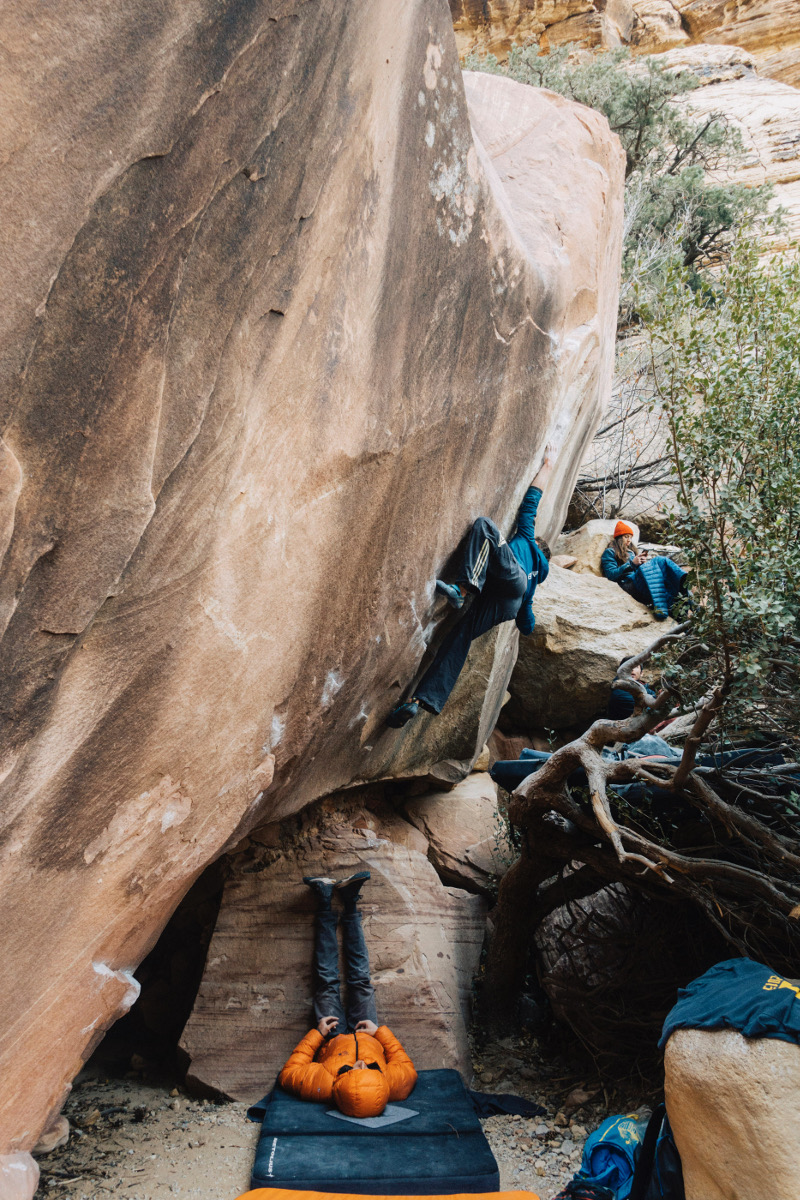
After flying back from OR, I had my most promising session yet. While I was really tired after many close tries from the bottom, I was able to link two difficult moves into the stand start—a link I’d never done before.
There was something Spartan and badass about the fantasy of sending it by myself. But the real reason was that I couldn’t find anyone to go with me…
Two days later, I planned on going out alone. The Nest is a really safe problem for how long it is because of the pad platform in the tree. There was something Spartan and badass about the fantasy of sending it by myself. But the real reason was that I couldn’t find anyone to go with me and I’d been feeling guilty for dragging friends out there to hang out and film me (having panic attacks in front of this rock, an hour’s hike from the road, until well after dark).
I hiked out to The Nest in the warmth of the late afternoon to stretch and get ready, climbing the stand start to cap off my warm up. Despite how nervous I was, it felt easier than ever. Darkness descended, followed quickly by the rise of a nearly full moon.
I fell on the bump move on my first try from the bottom, but I noticed how well-rested and strong my muscles felt. After my second failed attempt, I rested for only a minute and then easily repeated the stand start. Right then, a small but important switch flipped within me—my body had done so many near-effortless laps on the hard part that my mind had no choice but to acknowledge the fact that it was easy. EASY.
“Holy shit,” I thought. “I can do this.”
Before my third try, I laid down on the pads at the base of the problem. I looked up at the wall that was now bathed in beautiful moonlight, visualizing the moves—where I readjust, where I pause to breathe, where I always let go…but when I got to the crux in my visualization, I climbed through it. “Holy shit,” I thought. “I can do this.”
I pulled on and cruised through the opening sequence. I felt strong and relaxed, and for the first time ever, I stuck the bump move easily, without hesitation. In a flash, I realized where I was. I started to go wobbly, losing some of the tension with my feet. I let out a try-hard yell as I went for the good hold out left. Just as I latched it, my right hand exploded off the gaston. My yell changed from one of determination to one of anger. A split second later I was on the pads.
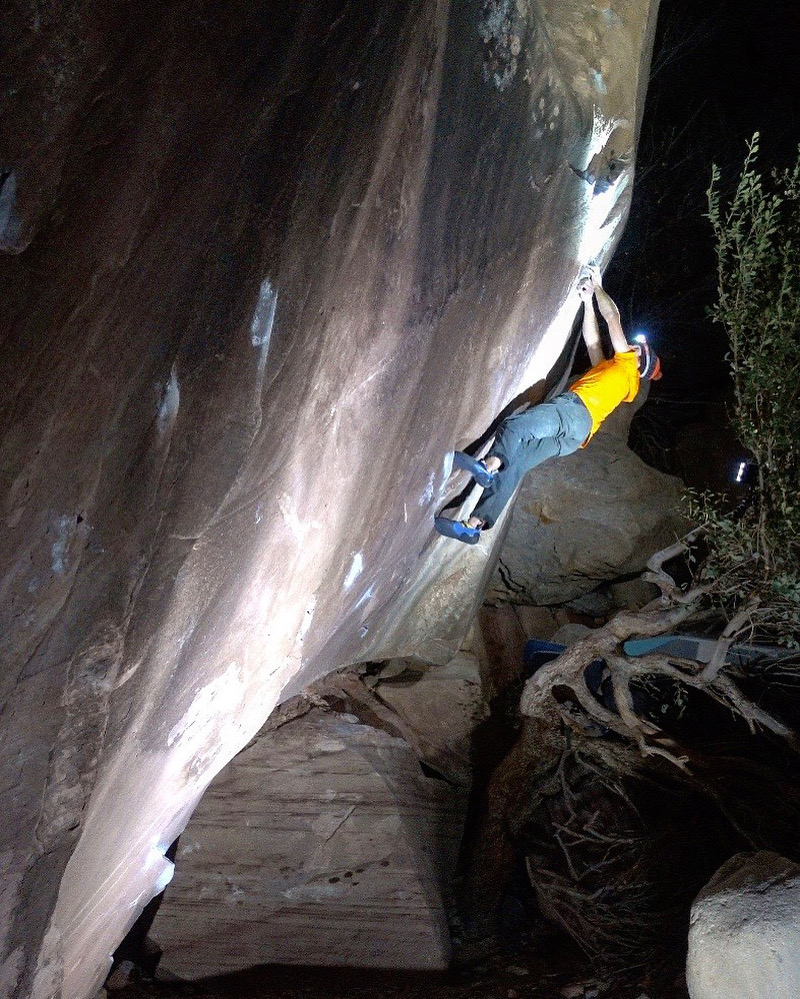
The mental barrier I’d erected over the last three years crumbled away, with the knowledge that I was undeniably capable of sending The Nest right now, and I started to sob uncontrollably. A minute later, all the torment I’d gone through in front of this wall somehow seemed funny from this new perspective, and my sobs morphed into hysterical laughter.
My mind jumped back into self-doubt territory with alarming speed: What if I can’t stick that move again from the ground?
Eventually, I calmed down and collected myself to prepare for another try. On my next try, I nearly stuck the bump again but came up slightly short and slid off the hold. It was still my second best try ever, but it wasn’t the top. The try after that, I wasn’t as close. My mind jumped back into self-doubt territory with alarming speed: What if I can’t stick that move again from the ground?
Around 9:30, I could feel the fatigue starting to set in. I had enough strength to try a couple more times, but my mind raced ahead, thinking about what day I’d be able to come back next. While I rested, I called my girlfriend Stacy who was on her way home from the climbing gym. Telling her about my new highpoint, about the solo session, and then sharing a few laughs seemed to remove me slightly from my anxious state. An idea popped into my head: What if I set up my phone on my next try so that she could watch over FaceTime, just for fun? She sounded apprehensive, saying we shouldn’t do it if it wouldn’t allow me to take the try as seriously. That was exactly what I was hoping it would do, but I reassured her it would be a serious try.
I could hear Stacy’s voice reminding me to breathe. I got to the crux and all of a sudden, I felt a huge surge of confidence. I stuck the bump move again without hesitation.
I set up the spotlights to illuminate the wall, the camera that I’d purchased earlier that day, and my phone with Stacy on the screen. I lay at the base of the wall and again visualized the moves. I didn’t feel super confident but was open to the possibility that I was still capable of sending this try. Starting up the problem, I could hear Stacy’s voice reminding me to breathe. I got to the crux and all of a sudden, I felt a huge surge of confidence. I stuck the bump move again without hesitation. This time I breathed and took my time, making sure not to rush the last move to the good hold. I stuck it and matched, in disbelief, and let out a guttural yell. I death-gripped the in-cuts over the bulge, stood up onto the slab, and put my hands on the lip. I couldn’t help but scream like a banshee as I scrambled over the top of the wall. For five minutes straight I yelled like someone who’d just won the lottery. Stacy yelled and laughed in LA, and our voices echoed through the moonlit canyon. I could see a small part of Vegas glowing orange in the distance.
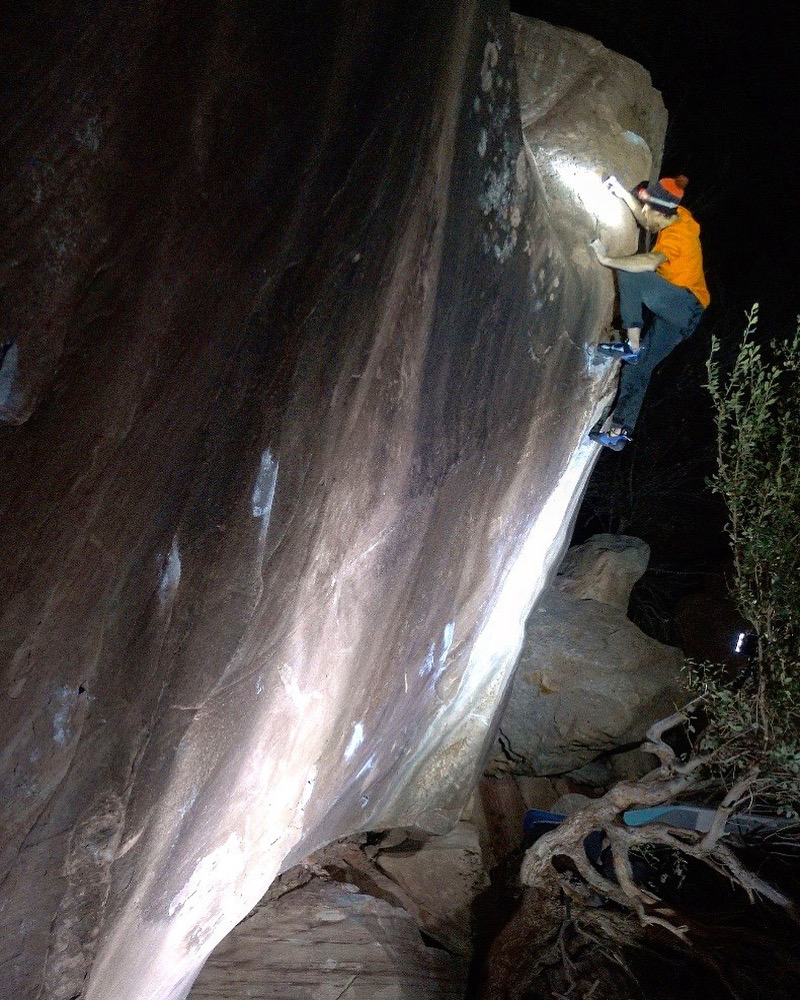
Just like that, it was done. More than 50 days of effort, hundreds of miles of hiking, hundreds of hours spent at this boulder, thousands of tries, and it was all over in a minute. I’d finally had the experience I was looking for. All the hard work and determination; all the blood, sweat, and tears; all the self-criticism and self-doubt; and all the enduring hope made it that much more powerful. It was a journey I’ll never forget.

